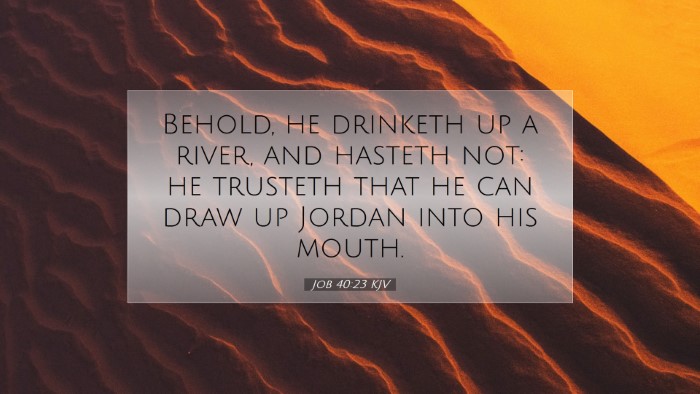Old Testament
Genesis Exodus Leviticus Numbers Deuteronomy Joshua Judges Ruth 1 Samuel 2 Samuel 1 Kings 2 Kings 1 Chronicles 2 Chronicles Ezra Nehemiah Esther Job Psalms Proverbs Ecclesiastes Song of Solomon Isaiah Jeremiah Lamentations Ezekiel Daniel Hosea Joel Amos Obadiah Jonah Micah Nahum Habakkuk Zephaniah Haggai Zechariah MalachiJob 40:23
Job 40:23 KJV
Behold, he drinketh up a river, and hasteth not: he trusteth that he can draw up Jordan into his mouth.
Job 40:23 Bible Commentary
Commentary on Job 40:23
Introduction
In the context of the Book of Job, Job 40:23 serves as a pivotal verse that encapsulates the themes of divine sovereignty, human limitation, and the nature of God's creation. The verse reads: "Behold, he drinketh up a river, and hasteth not: he trusteth that he can draw up Jordan into his mouth." This portrayal underscores the majesty of God's creation and invites reflection on the majesty of the Creator Himself.
Analysis of the Verse
Divine Sovereignty
Job 40:23 presents a vivid image of a great creature consuming vast amounts of water, illustrating the immense power inherent in God's creations. According to Matthew Henry, this verse is a part of God's response to Job, revealing that divine control extends even to the most formidable forces of nature. Henry emphasizes that such imagery is not just about the creature itself but about the Creator's authority over all creation.
The Metaphor of the River
Albert Barnes notes that the reference to "drinketh up a river" is indicative of an overwhelming strength that surpasses human comprehension. This metaphor serves both as a literal expression of the creature's might and a symbolic representation of God's ability to govern the chaotic elements of the world. In this light, the creature’s apparent nonchalance in the face of such resources speaks volumes about the confidence instilled by its Creator.
Theological Implications
Human Limitations
This verse stands as a reflection on human limitations compared to God's infinite power. Adam Clarke elaborates on how Job, in his suffering and questioning, must recognize the vast chasm between human understanding and divine wisdom. Clarke suggests that while Job desires to comprehend God’s dealings, God directs him to observe the wonders of His creation, reinforcing the notion that some divine truths are beyond human discernment.
- The Nature of Trust
- The Power of Faith
The phrase “he trusteth that he can draw up Jordan into his mouth” can be interpreted to mean a reliance on strength that seems absurd to those who understand the nature of the river. Henry posits that this illustrates the folly of misplaced confidence, reflecting back to Job's own assumptions about his situation and demanding a reconsideration of faith and trust in God.
Moreover, this passage invites readers to consider the nature of faith itself. Just as the creature appears to possess strength beyond mortal comprehension, believers are called to trust in the divine despite their circumstances. Through the lens of Barnes, this can be seen as a call to relinquish control and rest in the omnipotence of God.
Practical Applications
Lessons for Believers
In contemporary applications, Job 40:23 presents themes that are relevant for pastors and theologians alike. The vastness of God's created order serves as a reminder of His majesty and the comfort that can be found in His presence. As Clarke notes, recognizing one's limitations in the face of God's greatness can empower believers to approach Him with reverence and openness to His will.
- Endurance in Suffering
- Encouragement in Ministry
Believers undergoing trials should consider how God is still in control, much like the creature has dominion over its environment. This understanding fosters endurance and patience in the face of life’s torrents.
For pastors, the verse can be a source of encouragement in leadership, reminding them to look to God as the ultimate source of strength and to encourage their congregants to do the same.
Conclusion
Job 40:23 encapsulates a powerful theological message about the nature of God’s sovereignty and the call for human beings to recognize their own limitations. By merging insights from the commentaries of Matthew Henry, Albert Barnes, and Adam Clarke, we find a rich tapestry of reflections that deepen our understanding of this text. The imagery of a creature drinking a river invites theologians and students alike to contemplate the grandeur of God and to trust Him in the depths of our personal trials.


